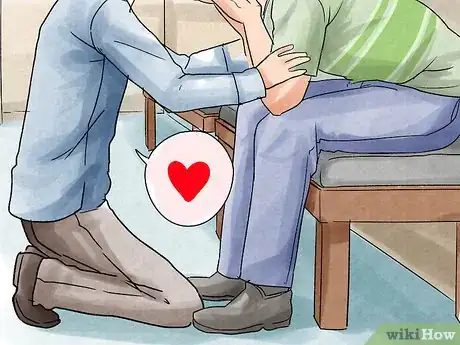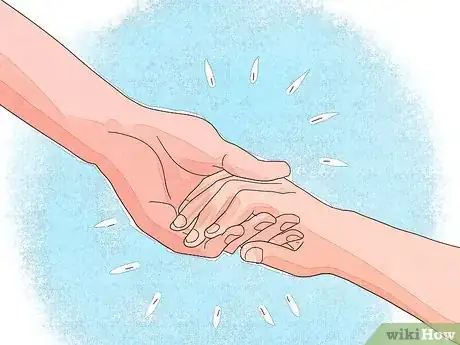This article was co-authored by Liana Georgoulis, PsyD. Dr. Liana Georgoulis is a Licensed Clinical Psychologist with over 10 years of experience, and is now the Clinical Director at Coast Psychological Services in Los Angeles, California. She received her Doctor of Psychology from Pepperdine University in 2009. Her practice provides cognitive behavioral therapy and other evidence-based therapies for adolescents, adults, and couples.
There are 13 references cited in this article, which can be found at the bottom of the page.
wikiHow marks an article as reader-approved once it receives enough positive feedback. In this case, 93% of readers who voted found the article helpful, earning it our reader-approved status.
This article has been viewed 32,467 times.
Emotional maturity is characterized by an ability to recognize your faults and biases and take ownership when you're wrong. It's not something that just happens--you may have to make a conscious effort to become emotionally mature. Emotional immaturity, on the other hand, can lead you to lash out at others when you experience difficult feelings and ultimately damage your relationships. Working on yourself and becoming an emotionally mature person is possible when you put others before you, change your attitude, and learn to seek support from others.
Steps
Putting Others Before You
-
1Practice self-care. Self-care involves taking care of your physical and emotional well-being. When you feel your best you will be able to give freely to care for others. A good start would be getting regular check ups at the doctor, eating nutritious food, getting some exercise, and enjoying some of your favorite hobbies. Neglecting yourself can cause you to feel fatigued and depressed, which make it difficult to grow.
-
2Volunteer your time. A sign of emotional maturity is allowing others' needs to come before your own. Volunteering somewhere allows you to help others and can help you achieve humility. Seeing how other people live and being able to empathize with them is a step in the right direction towards emotional maturity.
- Find volunteer opportunities in your area such as an animal shelter or senior center. You can also simply give your time to someone who is need, such as a co-worker, neighbor, or family member.[1]
Advertisement -
3Put yourself in someone else's shoes. An emotionally immature person typically only sees one side of the situation: their own. They tend not to see what someone else could be going through. If you try to imagine yourself as that person, however, you may learn something new about yourself, and them.
- For instance, when you have a disagreement with someone, consider things from their perspective. Ask yourself what previous life experiences that person has had, if they knew the same information as you leading up to the situation, and what is going on in their home life. Imagine yourself as them once you've asked yourself these questions and you may be able to change your stance.[2]
- Let's say your friend is a person of color who tells you that you are naturally privileged. With emotional maturity, you should be able to take a step back see how being of the majority race gives you more privilege than being a minority.[3]
-
4Let go of always needing to be right. Hearing that you are wrong is often difficult, as is not getting your way. However, you'll need to let that go if you want to be emotionally mature. This type of maturity means being OK with allowing someone else to win an argument or two, or letting them have the last word.
- Learn to say, “Let's agree to disagree” when you are in a debate with someone. Allowing yourself to let it go and not have to win for the sake of winning can help you keep integrity and a relationship with the person with whom you are having the disagreement.[4]
Changing Your Attitude
-
1Work on being positive. Emotionally immature people focus on the negative aspects of what is going on around them. They become irrationally upset when things don't work out the way they want and take their negative behavior out on others. Focusing on the positives in situations and believing that it will work out can keep you emotionally stable.[5]
-
2Practice being grateful. Catalog some of the people and things you are grateful for by writing them down. Place your list in a safe place so you can remind yourself of all you have to be thankful for when life gets challenging. This can help combat anxiety and depression that might hold you back.
- Ask yourself how you can make each situation you enter a “win-win.” Then realistically determine what will happen if the scenario doesn't work out the way you want. You'll likely see that the potential negatives aren't really that big of a deal and you're able to handle whatever comes your way.
- For example, you set a goal to move to a new city but you were delayed after a job loss. With emotional maturity, you can bounce back and develop a new plan that helps you reach your goal while considering your new circumstances.
-
3Enter relationships for the right reasons. Stop always focusing on what you can get out of relationships. Instead, think about how you can help each other. Be generous with your emotions and try not to take other people for granted.
- In romantic relationships, avoid seeking out someone only for physical reasons, as emotionally immature people tend to do. Rather, look for someone who can fill your emotional needs and for someone who you can enjoy spending time with.[6]
-
4Take accountability for your actions. Everyone makes mistakes; however, the way you handle them is a sign of your emotional maturity level. Projecting your errors on others is a sign of emotional immaturity. Taking responsibility for what you've done wrong shows that you are mature.
- For instance, you shut out a friend who is trying to help you. An emotionally immature person may refuse to see that this is not helping the situation. Meanwhile, if you are emotionally mature, you will recognize that you are wrong and apologize to your friend.
- Practice saying phrases like “I'm sorry” and “That was my mistake.” People are more accepting to slip-ups when the person is genuinely apologetic rather than trying to blame others.[7]
-
5Respect other people's boundaries. Boundaries are created for protection. Pushing these boundaries makes people feel uncomfortable and violated. Respecting these boundaries shows that you are mature and care about other people's needs instead of your own.
- People who push their agendas on others and focus more on what they want rather than what is beneficial for both parties typically end up hurting others. However, emotionally mature people would rather make someone else feel better than get what they want. This is especially true if they know getting what they want will make the other person uncomfortable.[8]
-
6Look for the lesson in each experience. Even in the worst of situations, there is valuable learning you can do to grow and improve your life. Sometimes in the heat of the bad situation it can be difficult to tease out the lesson, but it is up to you to reflect afterward to identify what you have learned. Consider how will you use what you have absorbed to become a better person. It can be helpful to write it down.
-
7Tell the truth. Emotionally immature people tend to lie. They may lie to get out of their mistakes or use it as a way to make them seem more appealing. Either way, their main focus is to make themselves look better instead of living with integrity.[9]
- This step may take some effort on your part. Being vulnerable and open with your flaws is difficult for anyone, particularly people who struggle with emotional immaturity. However, you'll find that telling the truth gains respect, from others and yourself. Let go of your pride and simply say the truth. You'll feel much better about yourself in the end.
Getting Support in Your Journey
-
1Confide in others for help. The path to emotional maturity can be a tough one. Having people around you to support you can make a huge difference. Tell your family and loved ones about your journey and ask them to keep you accountable.[10]
- For instance, you can say, “I've decided I'm going to take steps to become a better person and more emotionally mature. Please let me know when you feel that I am slipping and not behaving the way I want.” Those who love you can keep you in check. And remember to accept their criticism in a mature manner.
-
2Talk to a professional. Becoming emotionally mature can be a difficult process. Talking to a professional about how to get to this goal is often helpful. A therapist or counselor may help you understand why you haven't reached the maturity level you desire and can give you pointers on how to get there.[11]
- Ask friends and family the name of a therapist or counselor they trust. You can also ask your primary doctor for suggestions if you are having difficulty finding someone to help you.[12]
-
3Join a support group. Joining a support group that helps you to work on these behaviors can help you reach the maturity level you desire. It also puts you in contact with people who may have suggestions on how you can get there and who can hold you accountable when you fail.
- For instance, part of your emotional immaturity could cause you to have an explosive temper or narcissistic qualities. Joining a support group for people with similar problems can give you the help you need to combat them.[13]
Expert Q&A
-
QuestionWhat should I know before going to therapy?
 Liana Georgoulis, PsyDDr. Liana Georgoulis is a Licensed Clinical Psychologist with over 10 years of experience, and is now the Clinical Director at Coast Psychological Services in Los Angeles, California. She received her Doctor of Psychology from Pepperdine University in 2009. Her practice provides cognitive behavioral therapy and other evidence-based therapies for adolescents, adults, and couples.
Liana Georgoulis, PsyDDr. Liana Georgoulis is a Licensed Clinical Psychologist with over 10 years of experience, and is now the Clinical Director at Coast Psychological Services in Los Angeles, California. She received her Doctor of Psychology from Pepperdine University in 2009. Her practice provides cognitive behavioral therapy and other evidence-based therapies for adolescents, adults, and couples.
Licensed Psychologist It's really helpful to understand that it's totally normal to go to therapy. There's nothing wrong with reaching out to get help or trying to improve your mental health!
It's really helpful to understand that it's totally normal to go to therapy. There's nothing wrong with reaching out to get help or trying to improve your mental health!
References
- ↑ https://www.helpguide.org/articles/work-career/volunteering-and-its-surprising-benefits.htm
- ↑ https://www.psychologytoday.com/blog/ambigamy/200905/empathic-intelligence-put-yourself-in-their-shoes-unlace-yours
- ↑ https://www.mindbodygreen.com/0-16995/9-signs-of-emotional-maturity.html
- ↑ http://www.ksl.com/?sid=41955652&nid=1010&title=14-ways-to-be-more-emotionally-mature
- ↑ https://www.psychologytoday.com/blog/the-human-experience/201306/six-aspects-being-adult
- ↑ https://www.psychologytoday.com/blog/emotional-fitness/201208/10-reasons-be-in-relationship
- ↑ https://www.entrepreneur.com/article/282654
- ↑ https://www.mindbodygreen.com/0-23987/13-signs-of-an-emotionally-mature-man.html
- ↑ http://www.lifehack.org/articles/communication/4-reasons-why-you-should-always-honest.html
- ↑ http://www.huffingtonpost.com/alicia/accountability-goals_b_7845608.html
- ↑ Liana Georgoulis, PsyD. Licensed Psychologist. Expert Interview. 6 September 2018.
- ↑ https://www.helpguide.org/articles/emotional-health/finding-a-therapist-who-can-help-you-heal.htm
- ↑ http://www.webmd.com/anxiety-panic/guide/anxiety-support-group#1









































































